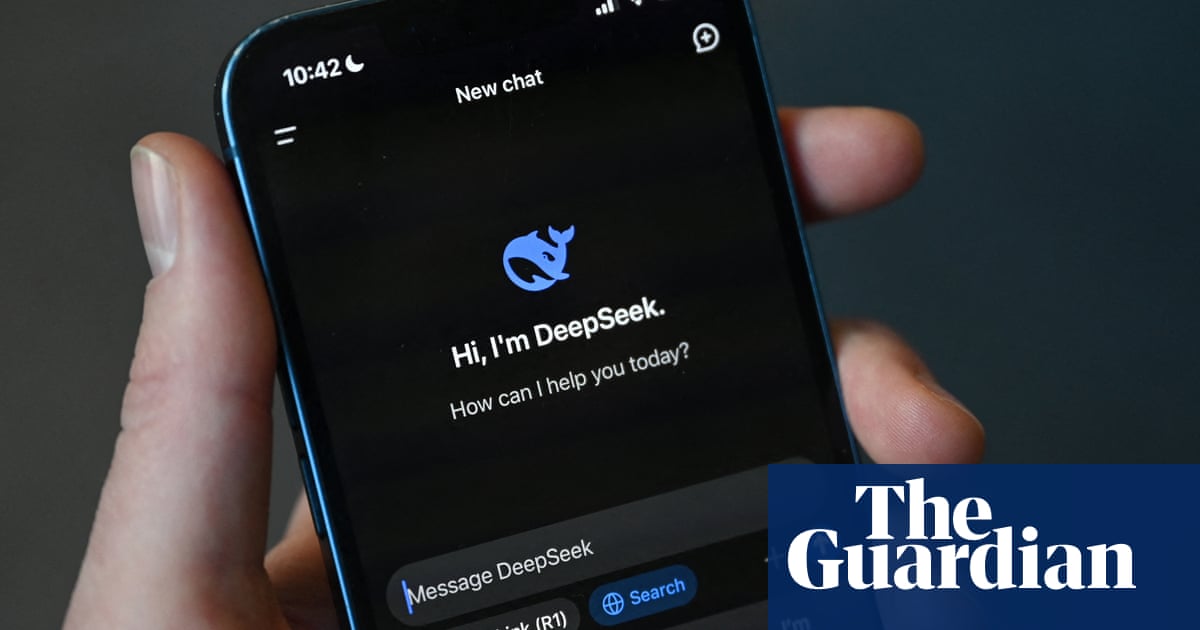Global tech shares fall as China AI chatbot DeepSeek spooks investors

Global technology shares have taken a hit as the emergence of a Chinese chatbot competitor to OpenAI’s ChatGPT, DeepSeek, raised doubts about the sustainability of the US artificial intelligence boom.
Shares in companies listed in Asia and Europe fell on Monday and the tech-heavy Nasdaq index in New York was poised to open lower after investors digested the implications of AI models developed by the startup DeepSeek.
The DeepSeek AI assistant topped the Apple app store in the US and UK over the weekend, above OpenAI’s ChatGPT.
Shares in AI-related companies based in the US such as Nvidia, Microsoft and Meta were expected to fall when US markets open.
DeepSeek claims to have used fewer chips than its rivals to develop its models, making them cheaper to produce and raising questions over a multibillion-dollar AI spending spree by US companies that has boosted markets in recent years.
The company developed bespoke algorithms to build its model using reduced capability H800 chips produced by America’s Nvidia and spending less than $6m (£4.8m), according to a research paper published in December.
Nvidia’s most advanced chips, H100s, have been banned from export to China since September 2022 by US sanctions. Nvidia then developed the less powerful H800 chips for the Chinese market, although they were also banned from export to China last October.
DeepSeek’s success at building an advanced AI model without access to the most cutting-edge US technology has raised concerns about the efficacy of Washington’s attempts to stymie China’s high-tech sector.
Marc Andreessen, a leading US venture capitalist, compared the launch of DeepSeek’s R1 model to a pivotal moment in the US-USSR space race, posting on X on Sunday that it was AI’s “Sputnik moment”.
According to DeepSeek, its R1 model outperforms OpenAI’s o1 mini model across “various benchmarks”, while research by Artificial Analysis puts it above models developed by Google, Meta and Anthropic in terms of overall quality.
The company was founded by the entrepreneur Liang Wenfeng, who runs a hedge fund, High-Flyer Capital, that uses AI to identify patterns in stock prices. Liang reportedly started buying Nvidia chips in 2021 to develop AI models as a hobby, bankrolled by his hedge fund. In 2023, he founded DeepSeek, which is based in the eastern Chinese city of Hangzhou.
The company is purely focused on research rather than commercial products – the DeepSeek assistant and underlying code can be downloaded for free. In an interview with Chinese media, Liang said “AI should be affordable and accessible to everyone.” Liang also said that the gap between US and Chinese AI was just one to two years.
after newsletter promotion
The DeepSeek development raises doubts over the necessity for sustained investment in AI infrastructure such as chips and the market-leading role of US tech companies in AI, which in turn threatens to put American tech sector valuations under pressure.
The pan-European Stoxx 600 lost 0.75% on Monday morning, and technology stocks were down by 4.5%. The Dutch chipmaker ASML slid by 8.2%, while Germany’s Siemens Energy, which provides hardware for AI infrastructure, lost 4.1% and France’s digital automation company Schneider Electric fell by 6.8%.
US-listed shares in Nvidia, the chipmaker at the forefront of developments in AI and is the world’s most valuable listed company with a valuation of $3.5tn, were down more than 11% in pre-market trading.
It followed losses in Asia, where the Japanese chip companies Disco and Advantest – a supplier to Nvidia – suffered declines of 1.8% and 8.6% respectively. In the US, Nasdaq 100 futures were down 2.6% and S&P 500 futures slipped 1.4%.
Richard Hunter, the head of markets at the platform Interactive Investor, said: “It will almost certainly put the cat among the pigeons as investors scramble to assess the potential damage it could have on a burgeoning industry which has powered much of the gain seen in the main indices over the last couple of years.
“The larger question has suddenly become whether the hundreds of billions of dollar investment in AI needs re-evaluation.”
Related
Why investing in women is a vital next step for…
Get Nadine White's Race Report newsletter for a fresh perspective on the week's newsGet our free newsletter from The Independent's Race CorrespondentGet our fre
Business secretary signals major shift on electric car policy to…
In a determined effort to retain Nissan’s manufacturing presence in Britain, Business Secretary Jonathan Reynolds has vowed to implement “substantial c
Joint Statement: Business Secretary and Fujitsu Services Ltd
Business and Trade Secretary Jonathan Reynolds today (Friday 7 March) met chiefs for Fujitsu in Tokyo to begin talks over the cost of redress for victims of th
UK foreign secretary backs multilateral defence funding for Europe
UK foreign secretary David Lammy has said that a new multilateral fund will be needed to secure Europe’s defence as he confirmed that Britain is “open to”













